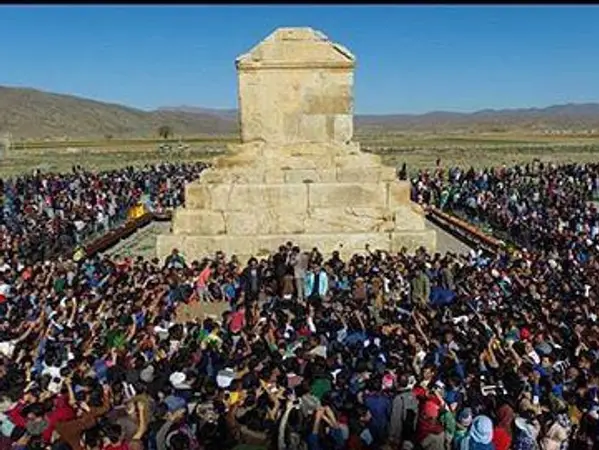Iranian security officials uttered a sigh of relief probably as October 29 came to an end and the long autumn day in Dasht-I Murghab plunged into dusk quietly.
The day coincided with Cyrus the Great Day, the founder of Iran's ancient dynasty, the Achaemenids, whose empire-building in the 6th century BC was marked with respect for diversity and human rights. His empire expanded from Central Asia and the eastern wing of the Persian plateau and beyond to Mediterranean shores and North Africa.
Cyrus the Great (circa 600-530 BC) Day on October 29 this year was relatively uneventful. However, security measures were deliberately visible in Shiraz, the nearest big city to the monument that is the ancient King's tomb in Pasargadae, some 60 miles into the mainly arid plain northwest of the city. The date was chosen based on estimates that he captures Babylon on October 28 or 29 in 539 BC.
Security police were vigilant in Shiraz since Thursday, questioning anyone who looked like a tourist to make sure that they were not going to visit Pasargadae, said eyewitnesses in Shiraz.
Friday morning, security forces arrested the parents of Navid Afkari, whose unfair trial and execution in 2019 caused havoc in Iran. The elderly parents were arrested with a birthday cake with the face of Cyrus the great painted on it with icing. Reports from Iran say they were released in less than two hours, after being warned to make sure that they will not be part of any demonstration to mark the royal birthday tow weeks before the anniversary of the 2019 protests during which security forces killed hundreds of peaceful demonstrators.
The reason for tight security measures in Shiraz and the road to Pasargadae was concern on the part of the authorities that like previous years, thousands would defy security measures and show up around the ancient King's tomb. The Islamic Republic has shunned Iran's long-standing history of thousands of years of monarchy as if it did not exist as an empire that ruled over most of the known world.
Another reason was that Prince Reza Pahlavi, the heir to Iran's monarchy, sent a message to the nation to mark the day. He called on Iranians: "Remember the name and memory of Cyrus the Great in any which way you can, wherever you are. Show the world that you are a united, freedom-loving and tolerant nation. Every one of you should represent the great ancient nation of Iran. The world should not identify Iran with the ruling criminal cult that is running the Islamic Republic."
The current regime has been in denial of the popularity of Iran's monarchy and national heritage. Some religious zealots wanted to ruin the monuments in Pasargadae and Persepolis immediately after the 1979 Islamic Revolution, but people's resistance against fundamentalism did not allow them to do what they wanted.
Nonetheless, as recently as two weeks ago, President Ebrahim Raisi made a gaffe during a visit to Persepolis saying that the monuments were reminiscent of oppressor kings. He made the comment mindless of the fact that Cyrus the Great is internationally respected as a champion of human rights.
In a video posted on social media, Princess Ashraf Pahlavi, the twin sister of Shah Mohammad Reza Pahlavi, is seen donating some ancient works of art to the United Nations that testify to Iran's leading role as an advocate of human rights thousands of years ago.This was in sharp contrast to the anti-human rights image of the Islamic Republic most recently portrayed by the UN Rapporteur for Human Rights in Iran Javid Rehman.
Last week, when Cultural Heritage and Tourism Minister Ezzatollah Zarghami called for digging water wells around Cyrus the Great's tomb, an act that would harm the monument, social media users such as cultural activist Mohammad Bagher Tabatabai warned Zarghamithat "The tomb of Cyrus the Great has a place in the heart of every Iranian. You can never destroy it."
Outside Iran, former US deputy assistant secretary of state Len Khodorkovsky wrote in an October 29 tweet: "Cyrus the Great is a source of pride for the Iranian people. His legacy of openness and tolerance will outlast the corruption and brutality of the temporary regime in power today, and usher in a new Iranian renaissance. "
During the past years, particularly after the 1979 Islamic revolution and despite the Islamic Republic’s violent crackdown on pro-monarchy demonstrations, thousands of Iranians rushed to Pasargadae to pay tribute to the great ancient king. The celebration found epic dimensions since 2016. Since 2017, the Revolutionary Guard (IRGC) has deployed forces to the region and blocked all roads to Pasargadae to make sure that the celebrations were not going to happen. But still, hundreds of young men and women somehow managed to gather around the monument and sing patriotic hymns.
In the absence of reliable reports from Iran, particularly about events the government does not want to be highlighted, it is extremely difficult to verify the date and authenticity of pictures that show gatherings around the monument with some paying their respect to Cyrus by kissing his burial ground. The celebration this year may have not been as monumental as previous years, but Iranians trended Cyrus' name as hashtags in Persian and English in the king's remembrance day.
